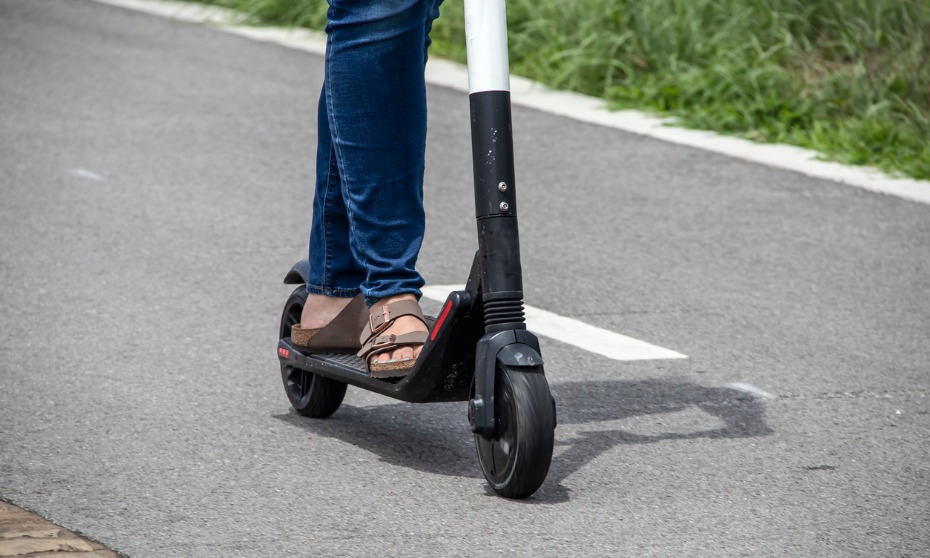
The hardest hit will likely be freelancers

Singapore’s Senior Minister of State for Transport Lam Pin Min announced in parliament that the use of e-scooters on footpaths will be banned from Tuesday (5 November).
During his speech, Dr Lam said the authorities are aware that banning e-scooters on footpaths could have an impact on employees like food delivery riders, who use the device for work.
However, he said “less than 30%” of riders depend on the personal mobility device (PMD), adding that the Land Transport Authority will work with online food delivery firms to help their riders switch to motorcycles or bicycles.
The controversial decision was made after months of public debate. The measure was likely implemented following several accidents involving errant e-scooter riders and pedestrians, with the latest case resulting in the death of an elderly woman.
Dr Lam said in parliament that the number of accidents involving e-scooters continue to rise. Calls for a total ban on its usage have been getting louder as more accidents occur, he added.
Dr Lam’s suggestion to help e-scooter riders transition to motorcycles may not be that simple, however, as Wilson Seng, president at PMD Retailers Association of Singapore told CNA that they may not hold a motorcycle licence, or be able to afford one.
Once the new law gets in play, e-scooter riders caught on pedestrian footpaths can be fined up to $2,000 and/or jailed up to three months.
Food delivery firms react
So what can employers do? Deliveroo, for one, said it’ll stop working with food delivery riders who use e-scooters on footpaths.
They’ve also sent out a memo to all riders to let them know of the new regulation.
They expect the ban to have “minimal impact” on operations – the spokesperson shared with CNA that PMD riders make up a mere 5% of its delivery team of 6,000 riders.
They added they halted hiring of PMD delivery riders in May, when the issue around its safety started blowing up in public.
Even without the ban, Deliveroo said they work closely with all riders to ensure compliance with safety rules and guidelines.
For instance, its onboarding program includes a mandatory session on road safety guidance. Management also regularly sends out the latest safety tips and information in weekly newsletters.
In response to the new ban, Deliveroo told CNA they’re speaking with their current PMD riders to see “how to best support them moving forward, including the possibility of helping them to transition to different vehicles if they prefer”.
Grab, however, is more concerned over the ban. Their spokesperson said Grab is planning to engage the government in further dialogue to allow “delivery-partners who have displayed responsible riding behaviour the option to continue using e-scooters under certain conditions for delivery”.
Their food delivery arm, GrabFood has a higher percentage of PMD riders – more than one in three use e-scooters to fulfil orders. The spokesperson added that these riders may not have access to other modes of transport.
Grab said they're committed to helping affected riders and will reach out to them by the end of the week.
READ MORE: How can HR be an effective ‘change leader’?
How can HR help in uncertain times?
Such legal changes may be out of employers’ control, but it can lead to job insecurity and thereby, raise anxieties and even workplace fear.
It can thus have a huge impact on staff – and leaders simply can’t afford to ignore it, warned one academic.
Despite the brewing climate of fear, many firms still expect to continue business-as-usual, which is unrealistic, the professor told HRD.
“The prevalence and strength of this workplace norm cause employees to be very reluctant to admit that they are afraid,” she said. “Nonetheless, it is essential to address fear at work because this negative emotion packs a wallop.”
The consequences of workplace fear are far and wide-reaching, she said. Some side effects include employee disengagement and presenteeism as well as reduced decision-making abilities and a significant drop in confidence.
Having studied how negative emotions affect the workplace, she offered leaders the following tips:
- Deal with employee fear head-on
“Action is a powerful antidote to fear,” she said. “Our research suggests that being frank and providing reasonable, realistic reassurance can signal that someone is in control. This awareness can help employees who are afraid.”
She said employers should give staff the opportunity to vent but ensure they aren’t exaggerating perceived dangers.
“To keep fear from spinning out of control, be honest and up front about challenges while infusing authentic enthusiasm about realistic opportunities and benefits that may lie ahead,” she said.
- ‘Over-communicate’ about potential changes
“A common source and stimulant of workplace anxiety is the rumour mill,” she said.
“My fellow researchers and I have observed managers and executives attempt to mitigate fear by withholding details of changes on the horizon.
“Rather than assuaging concerns, however, lack of information leads to speculation, often with worse outcomes than reality would hold.
“To ward off fear and avert this problem, over-communicate and find ways to recognise or reward those who persist despite their fears.”